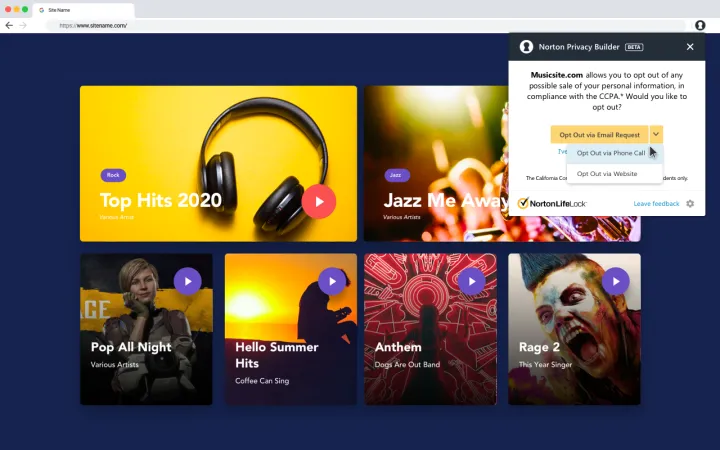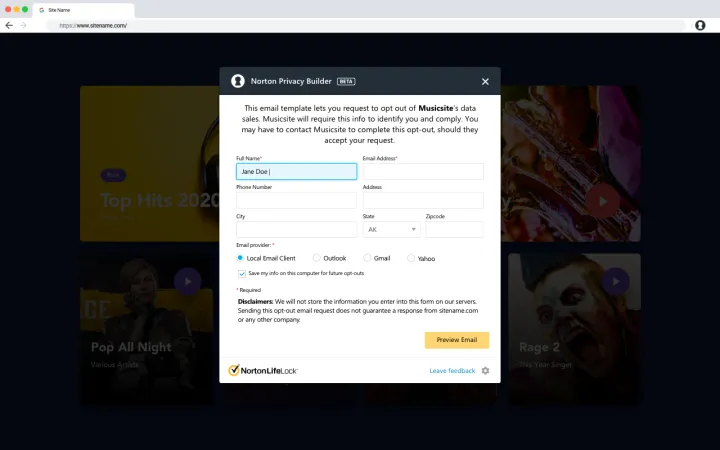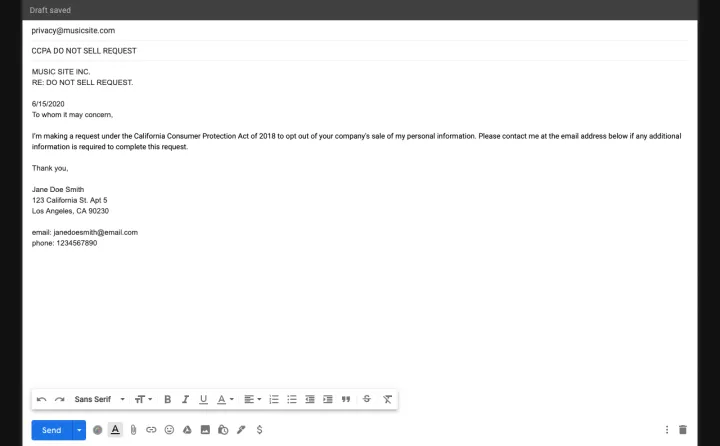Introducing Norton Privacy Builder
A new browser extension to help make it easier for California residents to opt-out of companies selling their information
Empowering California residents to take back and build their online privacy
Californians value their privacy. But taking advantage of legal privacy protections can be complicated. Norton Privacy Builder — a new browser extension — is designed to make it easy for consumers to tell businesses and websites not to sell their personal information.
A beta version of Norton Privacy Builder is being rolled out in California, which this year enacted one of the strongest privacy-protection laws in the nation. The enforcement deadline was July 1, 2020, but the regulations are not finalized as of the date of this blog.
Here’s what you need to know about California’s new privacy law and how Norton Privacy Builder can help state residents exercise their rights.
What is the California Consumer Protection Act and what does it cover?
The California Consumer Protection Act (CCPA) is a new privacy law that went into effect on January 1, 2020.
Under the CCPA, consumers are afforded new privacy rights regarding their personal information that companies, and websites collect. Some of the new privacy rights include:
- The right to opt-out of sale of personal information. Consumers are able to direct a business that sells personal information to stop selling that information. Children under 16 years old must provide opt-in consent, with a parent or guardian consenting for children under 13.
- The right to know what personal information is collected, used, shared, or sold. That includes both the categories and specific pieces of personal information.
- The right to delete personal information held by businesses and, by extension, a business’s service provider.
- The right to non-discrimination in terms of price or service when a consumer exercises a privacy right under CCPA.
Which companies must comply with California’s privacy law?
Companies that serve California residents, must comply with the CCPA if they satisfy one or more of the following thresholds:
- They have at least $25 million in annual gross revenue;
- They buy, sell, receive, or share alone or in combination the personal information of 50,000 or more, households, consumers, or devices; or
- Derives 50 percent or more of its annual revenues from selling consumer’s personal information.
How difficult is it to stop companies from selling your personal information?
NortonLifeLock has launched a new Chrome browser extension, Norton Privacy Builder(1) as a Beta(2), to streamline the opt-out process
Norton Privacy Builder is a purpose-built browser extension designed to help you save time when submitting “do not sell” opt-out requests, which helps you better manage and protect your personal information.
The purpose of the Beta is to provide a useful tool to help California residents better manage sales of their personal information on the Internet, understand how people use the tool, and get feedback before expanding the Privacy Builder feature set.
This first release aims to help make it easier for California residents to exercise their CCPA right to opt-out from sale of their personal information. Norton Privacy Builder Beta is available to download on the Chrome Web Store.
How does Norton Privacy Builder work?
After adding the Norton Privacy Builder browser extension, users of the extension can simply navigate to a website(3) and click on the keyhole icon at the top right corner of their browser.
Norton Privacy Builder searches a company website to find where the opt-out information is located and serves it up.
Simply choose one of the available opt-out options offered by a company and Norton Privacy Builder will help guide California consumers through the opt-out request process.



What are the benefits of Norton Privacy Builder browser extension?
Here’s how Norton Privacy Builder can help consumers build their online privacy.
• Helps make it easier to opt out of the sale of your personal information to a third party, which helps you better manage and protect your personal information.
• Lets you choose from available opt-out options offered on company websites, including opt-out via email, phone call, or website(4).
• Provides an email template form that saves time by helping to avoid having to re-enter email opt-out request information for each website.
• Features crowdsourcing to help make Norton Privacy Builder even better by allowing you to submit website requests to us to consider adding to our catalogue of sites and companies that will opt you out.
Norton Privacy Builder is from NortonLifeLock, one of the world’s most trusted Cyber Safety brands.







We encourage you to share your thoughts on your favorite social platform.